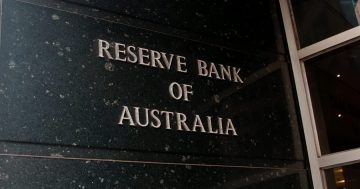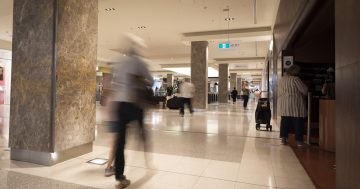Our fears and anxieties have been captured in some recent bank data — data which points to something of a big risk for the economy, writes David Taylor*.
 If there’s one thing you cannot control, it’s the amygdala.
If there’s one thing you cannot control, it’s the amygdala.
It’s the part of the brain that mediates aspects of emotional response and memory, including fear and anxiety.
The body goes into fight or flight mode.
When it comes to Omicron, the Prime Minister Scott Morrison wants Australians to fight.
“As we face Omicron, we must respect it, but we should not fear it.”
“We must respect it with sensible balanced rules, sensible precautions, at the same time not shutting Australia away, not locking ourselves up, and bringing our society to a halt,” the prime minister says.
The comments follow recent bank data suggesting Australians are not in fight mode, but rather flight mode, and its stalling the economic recovery that began in earnest in the wake of the Delta outbreak last year.
Confidence falls
The ANZ Bank measures levels of confidence among shoppers or consumers.
Its weekly measure was largely uninstructive before the pandemic, but it has since produced some shocking statistics, and yesterday’s data was a true shocker.
January usually finds shoppers feeling OK — the festive season is over, the credit card debt hasn’t hit yet, summer is in full flight.
But this year the bank has produced the weakest January consumer confidence report since 1992.
The weekly ANZ-Roy Morgan consumer confidence rating fell by 7.6 per cent — the biggest drop since March 2020 — to a 15-month low of 97.9 points.
The “time to buy a major household item” metric declined 11.4 per cent, falling to its lowest level since August 2020, the ANZ Bank noted.
Overall, sentiment about “current financial conditions” dropped 11.3 per cent, with 19 per cent of the respondents expecting to be worse off financially this time next year — the highest since September 2020.
The bottom line is people are worried.
Spending plummets
Being worried about going out and the safety of stores are directly linked with shoppers tightening their purse strings — even with our access to online shopping.
A separate report by the ANZ Bank shows the dive in spending that the arrival of Omicron triggered has continued in earnest well into January.
“National ANZ-observed spending shows that there is not yet any sign of recovery from the Omicron malaise in spending, with a decline of 27 per cent in the first half of January compared to the first half of December (compared with 17-21 per cent declines in previous years),” the report says.
The Commonwealth Bank’s spending data reveals a similar picture.
The bank’s card spending data to the week ending January 14 showed a slowdown in spending growth.
“Our assessment at this stage is that the surge in COVID cases over the past three weeks has resulted in about 3 per cent less spending over the period that would otherwise have been the case,” the CBA’s Global Markets Research team noted.
But it doesn’t see quite the crisis the ANZ sees.
“This is not a bad result considering the huge number of people that have been required to stay at home.”
OK, so now what?
Adding to the pressure on those in insecure and low-paid work is a wind back of the income support available to those who have to isolate.
The Pandemic Leave Disaster Payment was introduced back in August 2020 to support people who had COVID, had to isolate because they were a close contact, or had to look after someone with COVID.
On Tuesday, the federal government reduced the rate for those working less than 20 hours a week.
Their payment will drop to $450 from $750 a week, and those who do less than eight hours per week will no longer receive the payment.
The Australia Council of Social Service is warning thousands of workers are now approaching poverty.
The welfare group says there are additional costs associated with being sick and looking after the sick, and those on low incomes are bracing for tighter budgets.
“These are crucial dollars.
“We shouldn’t be forcing people to choose between feeding themselves and doing the right thing by keeping themselves safe,” ACOSS CEO Cassandra Goldie says.
The government’s calling for calm, reassuring businesses that tax breaks and help with debt remain for eligible for bosses.
And households, says Federal Treasurer Josh Frydenberg, are already cashed up and have plenty of financial buffers.
“Omicron is another big curve ball from this pandemic,” Morrison says.
“Over these last seven weeks we’ve been taking actions to address those impacts as best as we possibly can.”
“To what end? To save lives and to save livelihoods, and to make us as resilient as we possibly can be as further waves of the pandemic strike.”
‘Pushing through’
For individuals struggling already, that might be cold comfort.
But something else keeps ANZ Bank senior economist Adelaide Timbrell up at night: What if Omicron is replaced by another variant?
“The worst-case scenario is that this Omicron caution doesn’t ease up, or by the time Omicron eases up we see another variant which pushes spending down further,” Timbrell says.
“People are servicing their debt OK, but if the health side keeps people inside and keeps people struggling, then that’s going to be the biggest risk to the economy.”
Prior to the pandemic, the economy was growing but it was pretty lacklustre.
The pandemic and the resulting economic crisis gave the government a strong reason to throw out the idea of a surplus with a once-in-a-generation spending spree.
But now, at a fundamental level, the government is letting the economy stand up on its own, and the message is, we’re going to “push through” to the other side.
Well, the data so far suggests that Australians aren’t ready to push too hard.
The amygdala’s kicked in and many of us are just trying to survive.
*David Taylor is a business reporter for the ABC’s Audio Current Affairs programs.
This article first appeared at abc.net.au.










